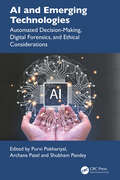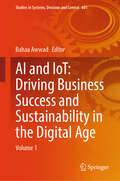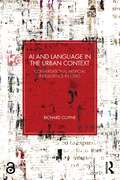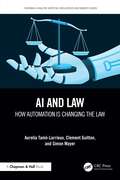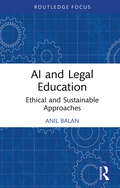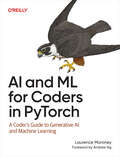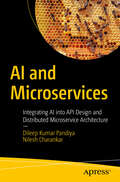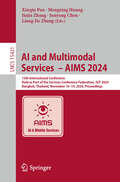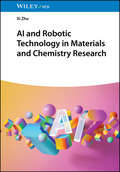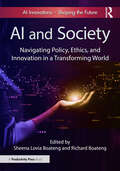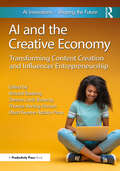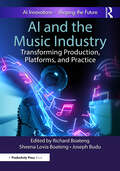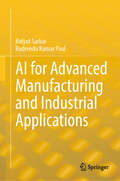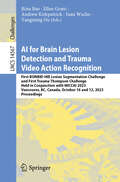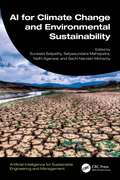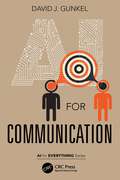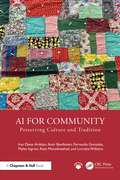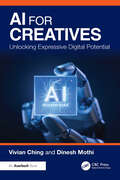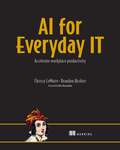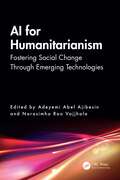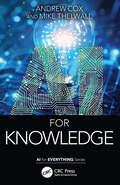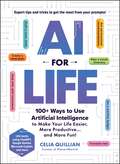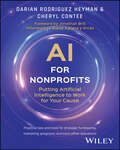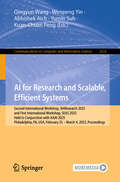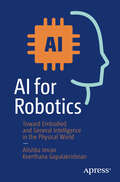- Table View
- List View
AI and Emerging Technologies: Automated Decision-Making, Digital Forensics, and Ethical Considerations
by Archana Patel Purvi Pokhariyal Shubham PandeyIn the past decade, Artificial Intelligence (AI) has made significant advancements in various sectors of society, such as education, health, e-commerce, media and entertainment, banking and finance, transportation, and defense, among others. Its application has permeated every sector, leaving no area untouched. However, the utilization of AI brings forth crucial legal, ethical, and technical concerns and obstacles that must be appropriately addressed through thoughtful deliberation, discussions, and the implementation of effective regulations.AI and Emerging Technologies: Automated Decision-Making, Digital Forensics, and Ethical Considerations provides a comprehensive and insightful roadmap for exploring the advancements, challenges, solutions, and implications of AI in three key areas: the legal field, gaming applications, digital forensic, and decision-making. By delving into these topics, this book offers a deep understanding of how AI can be optimally utilized to deliver maximum benefits to users, all within a single, comprehensive source. One of the focuses of this book is to shed light on the preictal application of emerging technologies in automated decision-making while also addressing the ethical considerations that arise from their use. By examining the integration of these technologies into digital forensics and their impact on other domains, such as gaming applications deep fake, this book presents valuable insights into the broader implications of AI.The book serves as an invaluable resource for anyone seeking to understand and navigate the complex world of AI. By offering a comprehensive exploration of its applications, ethical considerations, and data protection techniques, it provides researchers and scholars, graduate students, software engineers along with data scientists the necessary insights to harness the full potential of AI while ensuring its responsible and ethical use.
AI and IoT: Volume 1 (Studies in Systems, Decision and Control #601)
by Bahaa AwwadThis book explores the integration of AI technologies with emerging trends such as IoT, blockchain, and cloud computing. In this book readers will embark on a transformative journey that explores the powerful convergence of Artificial Intelligence (AI), Internet of Things (IoT), and business management. With the advent of these cutting-edge technologies, businesses have unprecedented opportunities to revolutionize their operations, drive innovation, and achieve remarkable success in today's digital landscape.
AI and Language in the Urban Context: Conversational Artificial Intelligence in Cities
by Richard CoyneIn a world influenced increasingly by artificial intelligence (AI), the city emerges as a dynamic hub of digital conversations. AI and Language in the Urban Context offers a novel exploration of how AI, particularly large language models (LLMs), is transforming urban environments. Moving beyond the typical technological narratives, this book draws on the author’s unique expertise in design, semiotics and hermeneutics to present a critical cultural perspective on AI’s role in the city.Focusing on the intersection of urban theory and AI, the book reveals how conversational AI is reshaping social interactions, decision-making processes, and media in urban spaces. By merging practical knowledge of AI algorithms with an understanding of urban practices, the author highlights the opportunities and challenges AI presents for modern cities.This book is essential for anyone interested in the future of urban living. It provides a deep dive into the technical, social and cultural implications of AI in cities, offering practical examples and philosophical insights. Readers will gain a comprehensive understanding of how AI is influencing the design, governance and dynamics of urban life in the digital age.The Open Access version of this book, available at www.taylorfrancis.com, has been made available under a Creative Commons [Attribution-Non Commercial-No Derivatives (CC-BY-NC-ND) 4.0 license.
AI and Law: How Automation is Changing the Law (Chapman & Hall/CRC Artificial Intelligence and Robotics Series)
by Aurelia Tamo-Larrieux Clement Guitton Simon MayerThis book provides insights into how AI is changing legal practice, government processes, and individuals’ access to those processes, encouraging each of us to consider how technological advances are changing the legal system. Particularly, and distinct from current debates on how to regulate AI, this books focuses on how the progressive merger between computational methods and legal rules changes the very structure and application of the law itself.We investigate how automation is changing the legal analysis, legal rulemaking, legal rule extraction, and application of legal rules and how this impacts individuals, policymakers, civil servants, and society at large. We show through many examples that a debate on how automation is changing the law is needed, which must revolve around the democratic legitimacy of the automation of legal processes, and be informed by the technical feasibility and tradeoffs of specific endeavors.
AI and Legal Education: Ethical and Sustainable Approaches (Routledge Research in the Law of Emerging Technologies)
by Anil BalanThis book provides a comprehensive interdisciplinary analysis of the sustainable and ethical integration of artificial intelligence (AI) within legal education, offering practical strategies for balancing innovation with ethical responsibility. Discussing the intersection of legal studies, technology and ethics, the book focuses on AI's role in reshaping professional education.With the rising demand for digital transformation in legal education and the increasing scrutiny of AI's ethical impact, this book explores the potential of AI to enhance legal learning and practice, while critically examining the challenges of data privacy, algorithmic bias and equitable access to technology. Outlining a framework for incorporating AI into the law curriculum, the book equips the readers with both cutting-edge technological skills and a deep understanding of AI’s ethical and societal implications. Drawing on a wide range of sources, including industry data and academic research, the book offers grounded, actionable guidance on implementing AI in a way that promotes inclusivity, sustainability and long-term relevance. It addresses the needs of legal education institutions, faculty and students, providing them with the tools to navigate the evolving legal landscape while maintaining ethical standards.The book will also be of interest to researchers in the fields of law, education and AI ethics.
AI and ML for Coders in PyTorch
by Laurence MoroneyEager to learn AI and machine learning but unsure where to start? Laurence Moroney's hands-on, code-first guide demystifies complex AI concepts without relying on advanced mathematics. Designed for programmers, it focuses on practical applications using PyTorch, helping you build real-world models without feeling overwhelmed.From computer vision and natural language processing (NLP) to generative AI with Hugging Face Transformers, this book equips you with the skills most in demand for AI development today. You'll also learn how to deploy your models across the web and cloud confidently.Gain the confidence to apply AI without needing advanced math or theory expertiseDiscover how to build AI models for computer vision, NLP, and sequence modeling with PyTorchLearn generative AI techniques with Hugging Face Diffusers and Transformers
AI and Microservices: Integrating AI into API Design and Distributed Microservice Architecture
by Dileep Kumar Pandiya Nilesh CharankarThis book explores how artificial intelligence (AI) is transforming the design and operation of microservices and API architecture. It provides a clear and practical guide to using AI to automate tasks, enhance performance, and improve the scalability of microservice-based systems. Starting with the basics, you will learn about the core concepts of microservices and API design, gradually building an understanding of how AI can be seamlessly integrated. Through real-world examples, visual diagrams, and mock APIs, the book shows you how to bring theory into practice, making complex systems easier to manage and more efficient. You will also discover strategies for testing and scaling systems, securing APIs, and addressing ethical challenges in AI-powered environments. Case studies highlight successful implementations, offering valuable insights you can apply to your own projects. Whether you're a developer, architect, or tech enthusiast, this book gives you the tools and inspiration to build smarter, more resilient systems while staying ahead of future trends in AI and distributed computing. What You'll Learn: Understand the basics of microservices and API design and see how AI can make these systems smarter and more efficient. Discover how to use AI in microservices and APIs to automate tasks, improve performance, and boost security. Learn how to design scalable and secure systems by following best practices and innovative approaches. Get practical tips on troubleshooting and solving challenges in AI-powered microservice architectures. Who is this book for: Software architects and engineers, AI and machine learning professionals, and DevOps engineers
AI and Multimodal Services – AIMS 2024: 13th International Conference, Held as Part of the Services Conference Federation, SCF 2024, Bangkok, Thailand, November 16–19, 2024, Proceedings (Lecture Notes in Computer Science #15421)
by Mengxing Huang Liang-Jie Zhang Xiuqin Pan Jiajia Zhang Junyang ChenThis book constitutes the refereed proceedings of the 13th International Conference on AI and Multimodal Services – AIMS 2024, AIMS 2024, Held as Part of the Services Conference Federation, SCF 2024, held in Bangkok, Thailand, during November 16-19, 2024. The 7 full papers and one short paper included in this book were carefully reviewed and selected from 16 submissions. They were organized in topical sections as follows: research track; application track; and short paper track.
AI and Robotic Technology in Materials and Chemistry Research
by Xi ZhuA singular resource for researchers seeking to apply artificial intelligence and robotics to materials science In AI and Robotic Technology in Materials and Chemistry Research, distinguished researcher Dr. Xi Zhu delivers an incisive and practical guide to the use of artificial intelligence and robotics in materials science and chemistry. Dr. Zhu explains the principles of AI from the perspective of a scientific researcher, including the challenges of applying the technology to chemical and biomaterials design. He offers concise interviews and surveys of highly regarded industry professionals and highlights the interdisciplinary and broad applicability of widely available AI tools like ChatGPT. The book covers computational methods and approaches from algorithms, models, and experimental data systems, and includes case studies that showcase the real-world applications of artificial intelligence and lab automation in a variety of scientific research settings from around the world. You'll also find: A thorough introduction to the challenges currently being faced by chemists and materials science researchers Comprehensive explorations of autonomous laboratories powered by artificial intelligence and robotics Practical discussions of a blockchain-powered anti-counterfeiting experimental data system in an autonomous laboratory In-depth treatments of large language models as applied to autonomous materials research Perfect for materials scientists, analytical chemists, and robotics engineers, AI and Robotic Technology in Materials and Chemistry Research will also benefit analytical and pharmaceutical chemists, computer analysts, and other professionals and researchers with an interest in artificial intelligence and robotics.
AI and Society: Navigating Policy, Ethics, and Innovation in a Transforming World
by Richard Boateng Sheena Lovia BoatengIn recent years, the profound impact of artificial intelligence (AI) on fostering new forms of entrepreneurship has become increasingly evident. Entrepreneurs worldwide are harnessing the capabilities of AI to develop innovative solutions and create businesses that address pressing challenges.Despite the growing recognition of AI’s potential, there exists a crucial need to deepen understanding and awareness surrounding how individuals are leveraging AI to establish novel ventures. Many entrepreneurs are pioneering initiatives that deploy AI technologies to tackle complex problems. This challenge revolves around the imperative to explore, document, and comprehend the diverse ways in which AI is driving the emergence of new businesses, solving real-world problems, and reshaping the entrepreneurial landscape. It underscores the necessity for entrepreneurs, researchers, and the wider community to grasp the transformative role of AI in fostering innovation and enabling the creation of businesses dedicated to addressing societal issues. Addressing this challenge will contribute to a more comprehensive understanding of the synergy between AI and entrepreneurship, paving the way for informed and impactful ventures that leverage the full potential of AI technologies.This book addresses the broader societal implications of AI, focusing on policy, education, and ethical considerations. It reviews national AI policies in Africa, explores AI-powered innovation in STEM education, and investigates the use of AI in fraudulent activities. It also discusses the integration of AI in the transport sector of developing countries, highlighting its potential to revolutionize infrastructure and services. In addition, it provides a holistic view of AI’s impact on society, emphasizing the need for ethical guidelines, regulatory frameworks, and continuous learning to harness AI responsibly. In a comparative analysis, it presents an exploration into the landscape of top-rated AI freelancers across Europe, North America, and South America, focusing on the intersection of gender and professional success in this burgeoning sector. It concludes with a discussion on the role of AI in the future of accounting in emerging economies.
AI and the Creative Economy: Transforming Content Creation and Influencer Entrepreneurship
by Richard Boateng Thomas Anning-Dorson Sheena Lovia Boateng Obed Kwame Adzaku PenuIn recent years, the profound impact of artificial intelligence (AI) on fostering new forms of entrepreneurship has become increasingly evident. Entrepreneurs worldwide are harnessing the capabilities of AI to develop innovative solutions and create businesses that address pressing challenges.Despite the growing recognition of AI’s potential, there exists a crucial need to deepen understanding and awareness surrounding how individuals are leveraging AI to establish novel ventures. Many entrepreneurs are pioneering initiatives that deploy AI technologies to tackle complex problems. This challenge revolves around the imperative to explore, document, and comprehend the diverse ways in which AI is driving the emergence of new businesses, solving real-world problems, and reshaping the entrepreneurial landscape. It underscores the necessity for entrepreneurs, researchers, and the wider community to grasp the transformative role of AI in fostering innovation and enabling the creation of businesses dedicated to addressing societal issues. Addressing this challenge will contribute to a more comprehensive understanding of the synergy between AI and entrepreneurship, paving the way for informed and impactful ventures that leverage the full potential of AI technologies.In this respect, the purpose of this book is to offer an in-depth exploration of the intersection between AI and entrepreneurial ventures. The book aims to provide a contemporary and thorough analysis of how AI is playing a pivotal role in shaping new forms of entrepreneurship across various industries. It seeks to illuminate the ways in which entrepreneurs are leveraging AI technologies to drive innovation, address challenges, and create businesses that contribute to societal progress.Focusing on the intersection of AI and the creative economy, this book examines the role of AI in content creation, social media, and influencer entrepreneurship. It provides a snapshot of current research, identifies gaps in knowledge, and presents case studies of content creators who have successfully integrated AI into their workflows. This book highlights the impact of AI on various forms of content creation, including educational, lifestyle, health, and entertainment content. It also includes a comprehensive syllabus for training entrepreneurs on leveraging AI for content creation, emphasizing the balance between technological advancements and maintaining authenticity.
AI and the Music Industry: Transforming Production, Platforms, and Practice
by Richard Boateng Sheena Lovia Boateng Joseph BuduIn recent years, the profound impact of artificial intelligence (AI) on fostering new forms of entrepreneurship has become increasingly evident. Entrepreneurs worldwide are harnessing the capabilities of AI to develop innovative solutions and create businesses that address pressing challenges.Despite the growing recognition of AI’s potential, there exists a crucial need to deepen understanding and awareness surrounding how individuals are leveraging AI to establish novel ventures. Many entrepreneurs are pioneering initiatives that deploy AI technologies to tackle complex problems. This challenge revolves around the imperative to explore, document, and comprehend the diverse ways in which AI is driving the emergence of new businesses, solving real-world problems, and reshaping the entrepreneurial landscape. It underscores the necessity for entrepreneurs, researchers, and the wider community to grasp the transformative role of AI in fostering innovation and enabling the creation of businesses dedicated to addressing societal issues. Addressing this challenge will contribute to a more comprehensive understanding of the synergy between AI and entrepreneurship, paving the way for informed and impactful ventures that leverage the full potential of AI technologies.This book delves into the transformative impacts of AI on the music industry. It reviews trends in digital platforms and music research, the integration of AI in music production, and the experiences of artists and music publishers using AI. It presents a comparative analysis of AI adoption patterns in the music industry and provides practical insights into the use of AI tools for music production and distribution. Additionally, it offers a detailed syllabus for training music industry stakeholders on harnessing AI technologies, illustrating the significant role AI plays in shaping the future of music.
AI for Advanced Manufacturing and Industrial Applications
by Bidyut Sarkar Rudrendu Kumar PaulThis book provides a deep dive into the applications of Artificial Intelligence (AI) in advanced manufacturing and intelligent autonomous systems. Through real-world use cases and cutting-edge insights, it examines how AI, machine learning, IoT, and Industry 5.0 are revolutionizing manufacturing processes from end to end. Discover how integrating AI technologies with data analytics and IoT can unlock smarter, more efficient, and adaptable manufacturing solutions. Learn how predictive algorithms can foresee equipment failures, optimize inventory in real time, and enable autonomous robots to handle complex tasks, from assembly to logistics. With these innovations, manufacturers can achieve new levels of productivity, drive innovation, and create future-ready business models. Designed for industry practitioners, decision-makers, and aspiring professionals, this comprehensive guide offers actionable strategies and practical insights for implementing AI in advanced manufacturing. Whether you&’re a leader seeking to modernize operations or a graduate student aiming to enter this dynamic field, this book will empower you to navigate and leverage the next frontier of industrial innovation.
AI for Brain Lesion Detection and Trauma Video Action Recognition: First BONBID-HIE Lesion Segmentation Challenge and First Trauma Thompson Challenge, Held in Conjunction with MICCAI 2023, Vancouver, BC, Canada, October 16 and 12, 2023, Proceedings (Lecture Notes in Computer Science #14567)
by Andrew Kirkpatrick Rina Bao Ellen Grant Juan Wachs Yangming OuThis book constitutes the proceedings of the First BONBID-HIE Lesion Segmentation Challenge and the First Trauma Thompson Challenge, held in conjunction with MICCAI 2023, in Vancouver, BC, Canada, during October 2023. For BONBID-HIE 2023 Challenge 6 papers have been accepted out of 14 submissions. They span a broad array of approaches leveraging anatomical information about HIE, data augmentation, training strategies, model architecture, and integration with traditional machine learning methods. For the TTC 2023 Trauma Thompson Challenge 4 accepted contributions are included in this book. They deal with advancements in machine learning methods and their practical applications in addressing small and diffuse lesions in HIE segmentation.
AI for Climate Change and Environmental Sustainability (Artificial Intelligence for Sustainable Engineering and Management)
by Suneeta Satpathy Sachi Nandan Mohanty Satyasundara Mahapatra Nidhi AgarwalThis book discusses the adverse effects of climatic changes on our planet. It examines AI-based tools and technologies and how they can assist in identifying energy emission reductions, CO2 removal, and support the development of greener transportation networks, monitoring deforestation, and forecasting extreme weather events.AI for Climate Change and Environmental Sustainability identifies and discusses in detail the importance of environmental sustainability based on accomplishment of the UN's 17 Sustainable Developmental Goals (SDGs). It presents the various AI-based possibilities for accelerating international efforts to safeguard the environment and conserve natural resources. The authors offer a comprehensive analysis of the emerging field of climate change in relation to Internet of Things, artificial intelligence, machine learning, and deep learning. The book discusses AI developments, applications, and best practices that will help us transition to a low-carbon future on both a regional and global scale. It provides case studies with analytical results pertinent to climate change and weather prediction and includes chapters with a research-oriented approach, which can encourage new developments in the field of sustainable climate and green environment.The book can be used as a primary textbook for graduate and postgraduate students in technology and science, as well as a reference for researchers, academics, and IT professionals working on climate change and sustainability initiatives.
AI for Communication (AI for Everything)
by David J. GunkelAI for Communication offers an engaging exploration into the diverse applications of artificial intelligence (AI) within the realm of communication. By bridging the gap between the scientific and engineering realms of AI and communication, this book reveals how AI, since its inception during the Dartmouth Summer workshop of 1956, has inherently been a science of communication. Exploring key advancements such as machine translation, natural language processing, large language models, computational creativity, and social robotics, this book shows how these innovations not only disrupt but also actively transform human communication.The book is designed for students, teachers, and general readers who want to know how the field of communication impacts and influences the theory and practice of AI and how recent developments in AI will affect all aspects of human social interaction.
AI for Community: Preserving Culture and Tradition
by Fernando Gonzalez Iran Davar Ardalan Amir Banifatemi Myles Ingram Reza Moradinezhad Lucretia WilliamsAI for Community explores the transformative potential of technology to bridge cultural divides and responsibly preserve cultural heritage, while thoughtfully considering how to ensure fairness without any ideological or cultural bias. It acknowledges the need for careful scrutiny of traditions so that artificial intelligence (AI) systems can promote comprehensive cultural understanding. This approach underscores the promise of AI as a tool for human flourishing.Authored by a multigenerational, multicultural team, this book presents real‑world examples and ethical insights that are timely, actionable, and deeply human‑centered. It introduces pioneering projects like the Indigenous Knowledge Graph, which documented ancestral wisdom; Howard University’s Project Elevate Black Voices, funded by Google, which enhanced speech recognition for African American Vernacular English (AAVE); and Laleh AI, which posthumously preserves the insights of a progressive female Islamic thinker. Also, initiatives like UNESCO’s work on cultural heritage preservation and NVIDIA’s collaboration with Te Hiku Media to safeguard the Māori language showcase AI’s vital role in reviving endangered languages.This book interweaves "Community Voices" sections between chapters, featuring interviews that explore the role and implementation of AI in new arenas. Each chapter is also supported by online resources, accessible as podcasts, videos, and articles, that provide multimedia ways to deepen understanding of culturally aware AI.AI for Community highlights how community‑driven language preservation, storytelling, and inclusive design can empower cultures and protect their heritage. This book is a vital resource for those seeking to create AI that respects and uplifts communities.
AI for Creatives: Unlocking Expressive Digital Potential
by Vivian Ching Dinesh MothiAI for Creatives: Unlocking Expressive Digital Potential takes you on a dynamic journey into the future of creativity, where AI is reshaping how creators approach their craft. According to a 2023 UNESCO report, the global creative industries are valued at an astounding USD 4.3 trillion annually, employing nearly 30 million people worldwide. This essential guide empowers professionals across visual arts, music, writing, film, fashion, and design to leverage the transformative potential of AI to elevate their work in ways previously unimaginable.Designed as a practical handbook for creative professionals, this book provides a clear and approachable road map for integrating AI into your work, regardless of prior experience. Packed with real-world case studies, step-by-step walk-throughs, and insights into AI-driven tools, like RunwayML, Midjourney, Canva, and ChatGPT, the book demonstrates how AI can supercharge creative processes. Whether you are a filmmaker using AI for hyper-realistic visuals or a fashion designer predicting fabric trends, this guide offers the tools to unlock your full creative potential.The book also dives into the deeper ethical and legal questions that emerge as machines increasingly enter the creative arena. How do we strike the right balance between human ingenuity and machine-driven creativity? What happens to intellectual property rights when AI becomes a co-creator? This book tackles these pressing issues head-on, from navigating bias in AI algorithms to safeguarding the authenticity of creative works, while also exploring the role of education in navigating these challenges. With actionable insights, creative professionals will learn to embrace AI while preserving the integrity, originality, and values that define their craft.AI is not just changing how we create but also disrupting the future of employment and economic growth across the globe. With the demand for creative roles projected to surge by 30–40% by 2030, it is evermore critical to harness the power of AI to stay ahead, innovate faster, and meet the growing need for creative solutions across industries. Are you ready to explore the future of creativity and amplify your vision? Step into the next era of AI transformation with this essential guide—your creative revolution starts now.
AI for Everyday IT: Accelerate workplace productivity
by Chrissy LeMaire Brandon AbshireAutomate and accelerate your everyday IT tasks with instant solutions!What if you never had to write another after-incident report, piece of boilerplate code, or a performance review from scratch ever again? Use AI tools like ChatGPT, Claude, Gemini, and Copilot right, and you&’ll take back hours of your time—and more! AI for Everyday IT reveals how you can automate dozens of your daily IT tasks with generative AI. In AI for Everyday IT you&’ll learn how to: • Write effective prompts for common IT tasks • Optimize report generation, document handling, and workplace communication • Resolve IT conflicts and crises • Acquire new skills and upgrade your resume • AI for help desk, database administration and systems administration • Incorporate AI into DevOps processes and create AI-powered applications • Simplify time-consuming people management tasks In this hands-on guide, automation experts Chrissy LeMaire and Brandon Abshire show you how AI tools like ChatGPT have made their lives a million times easier, and how they can do the same for you. You&’ll find proven strategies for using AI to improve help desk support, automate sysadmin and database tasks, aid with DevOps engineering, handle managing IT teams, and dozens more time-saving and quality-improving hacks. Foreword by Nitya Narasimhan. About the technology Have you lost days sifting through logs to find a latency issue? AI can do it in seconds! Need to update your documentation? Mere moments for AI. Are you writing scripts, designing data recovery strategies, and evaluating network designs? AI can handle it all—if you know how to use it. About the book AI for Everyday IT shows you exactly how AI can transform support desk operations, root cause analysis, disaster recovery planning—even writing professional emails when you&’re too furious to be nice! This instantly-useful guide has time-saving techniques for all IT pros—from devs and DBAs to technical writers and product managers. Each relatable example is fully illustrated with the prompts and problem formulation strategies, along with interesting insights and anecdotes from authors Chrissy Lemaire and Brandon Abshire. What's inside • Document handling and workplace communication • Database administration and development • DevOps engineering and AI powered apps • People management and career planning About the reader Whether you&’re working in operations, development, management, or security, you&’ll love these productivity hacks for generative AI. No previous AI experience required. About the author Chrissy LeMaire is a dual Microsoft MVP and GitHub Star, the creator of dbatools, and author of the Manning book Learn dbatools in a Month of Lunches. Brandon Abshire has spent over twenty years in IT, including roles at a leading Fortune 500 semiconductor and telecommunications company and multiple top-ranked US hospital systems. Table of Contents Part 1 1 Artificial intelligence in IT 2 Chatbots: Tasks and tips 3 Basic intelligence 4 Prompt engineering and problem formulation 5 Prompts in action 6 Document handling 7 Emails and instant messaging in the workplace Part 2 8 IT support and service desk 9 Systems administration 10 Database administration and development Part 3 11 Code assistants and development tools 12 AI in DevOps engineering 13 Building AI-powered applications Part 4 14 Conflict resolution and crisis management 15 Management essentials 16 Management interventions 17 Career advancement A Local AI models: An accessible alternative B OpenAI GPT Actions
AI for Humanitarianism: Fostering Social Change Through Emerging Technologies
by Pooja Sharma Christian Kaunert Manju Khari Bhupinder Singh Narasimha Rao Vajjhala Anjana Sharma Adeyemi Abel Ajibesin Bashir Eseyin Abdullahi Taiwo Abiodun Jyoti Batra Murat Tahir Çaldağ Eriona Çela Neelatphal Chanda Philip Eappen Azubuike Erike Tarcízio Ferrão Ebru Gökalp Ishayu Gupta Radha Srinivasan Iyer Yusuf Kabir Kasum Munir Maharazu Kubau Devender Kumar Bashir Malgwi Yusuf Mshelia Yerzhan B. Mukashev Emeka Ogbuju Francisca Oladipo Edoghogho Olaye Bamidele Oluwade Rajasekhara Mouly Potluri Babatunde Dauda Raheem Md Mahfujur Rahman Santhosh Kumar Rajamani Selene Roldán Ruiz Arturo Roman Cesar Sanjuan Hussein Umar Samuel C. Avemaria Utulu Ayush Verma Abraham ZirraThis book explores the transformative potential of artificial intelligence (AI) in addressing critical humanitarian challenges. It examines AI’s role in enhancing emergency responses, poverty alleviation, and healthcare.Chapters authored by a diverse group of international contributors cover topics such as AI’s application in disease prediction, ethical AI practices, and innovative resource distribution. This book uniquely blends theoretical insights with practical case studies, providing a road map for leveraging AI in humanitarian efforts. Readers will benefit from detailed explorations of AI’s capabilities and challenges, gaining insights into how AI can drive social change and improve global humanitarian outcomes.Targeted at policymakers, researchers, practitioners, and anyone interested in the intersection of AI and humanitarianism, this book offers valuable perspectives on ensuring AI technologies are both advanced and ethically sound.
AI for Knowledge (AI for Everything)
by Mike Thelwall Andrew CoxAI for Knowledge explores the question of whether artificial intelligence (AI) is transforming knowledge access and creation for the good. AI is accelerating our access to knowledge through search, recommendation, summarisation, translation and a proliferating range of tools with AI built in. Generative AI is further changing how we use and create information at home and in the workplace. Yet AI also has a dark side with hallucination, bias and lack of explainability, as well as potential for harmful impacts on social equity and the environment.The book investigates how AI will impact everyday knowledge discovery, understanding and creation. It considers both the positive benefits and the many informational and ethical challenges, including the impact on our wider information culture. It then weighs up the impact on scholarship, in science, social science and the humanities and including the processes of scholarly communication. It explains the role of libraries and archives and how they could be enhanced using AI. It concludes by showing how governments can regulate AI to ensure social benefit and outlines what we as individuals need to know about AI.The book helps the reader see through some of the AI hype to understand much more clearly what are the issues around the impact of AI on knowledge access and creation, including the implications for environmental sustainability and the power of Big Tech. What emerges is a nuanced picture of potential benefit and risk, especially when we consider the experiences of those with less privileged access to the digital, particularly those outside the Global North.
AI for Life: 100+ Ways to Use Artificial Intelligence to Make Your Life Easier, More Productive…and More Fun!
by Celia QuillianDemystify the world of artificial intelligence with this groundbreaking guide featuring over 100 innovative ways to incorporate AI into your daily life.Every day, it seems like there&’s a new AI tool on the market and a new, complicated way to use it. But what if you could use AI to make your life easier without the complications? In AI for Life, AI expert and creator of @SmartWorkAI offers over 100 ideas and ready-to-use prompts to get AI beginners started using the technology to actually improve their lives. Beginning with a primer on the basics—including an overview of the popular and free AI tools—you will learn expert-tested tips and tricks to get the most out of your AI use, such as layering prompts to dive deeper into an initial response or asking for the output in different formats. Packed with practical how-to information, AI for Life is the must-have guide for using generative AI to make life easier, more productive, more organized, and more fun!
AI for Nonprofits: Putting Artificial Intelligence to Work for Your Cause
by Darian Rodriguez Heyman Cheryl ConteeA collection of actionable AI tools you can apply immediately to help your nonprofit drive social impact and change In AI for Nonprofits: Putting Artificial Intelligence to Work for Your Cause, a team of leading nonprofit experts and social entrepreneurs delivers a startlingly insightful, strategic “how-to guide” for nonprofit and foundation leaders, board members, and volunteers, as well as higher education professionals and social entrepreneurs looking to deploy and integrate artificial intelligence tailored to their organization's mission and needs. It's the leading reference guide for people who are entirely new to AI, as well as tech-savvy veterans with a deep understanding of artificial intelligence looking for proven, hands-on techniques they can apply immediately to transform their nonprofits. Each chapter is based on interviews conducted with 57 of the nonprofit industry's most innovative and reputed voices. Together, they provide the latest strategies and tactics for nonprofit generative AI and predictive analytics applications, skills and competencies needed to effectively use this new technology, tips, tools, best practices, resource reviews, and the most common pitfalls to avoid. AI for Nonprofits walks you through exactly how to strategically customize artificial intelligence to improve your fundraising and resource development efforts, marketing and community engagement, program delivery, and back-office operations. From human resources management to program strategy, social listening, and donor research, the book provides the on-the-ground techniques you need to deploy to transform your nonprofit's operations. Inside the book: Step-by-step frameworks and actionable roadmaps to help you implement AI for content creation, donor engagement, and developing personalized messages at scale How to protect your donors' privacy and data with policies and practices that comply with rapidly shifting legal and regulatory landscapes Cutting-edge research and practical case studies drawn from real-world situations that illustrate concrete AI applications Access to 100+ tools, platforms, and providers focused on helping nonprofits optimize their use of AI AI for Nonprofits explains how to supercharge your organization's fundraising pipeline, marketing and community engagement, program delivery, back-office operations, and governance policies. It's perfect for nonprofit executives, managers, professionals, and leaders, AI for Nonprofits will also earn a place in the libraries of anyone with an interest in using AI to power social impact and change.
AI for Research and Scalable, Efficient Systems: Second International Workshop, AI4Research 2025, and First International Workshop, SEAS 2025, Held in Conjunction with AAAI 2025, Philadelphia, PA, USA, February 25–March 4, 2025, Proceedings (Communications in Computer and Information Science #2533)
by Kuan-Chuan Peng Wenpeng Yin Qingyun Wang Abhishek Aich Yumin SuhThis book constitutes the proceedings of the Second International Workshop, AI4Research 2025, and First International Workshop, SEAS 2025, which were held in conjunction with AAAI 2025, Philadelphia, PA, USA, during February 25–March 4, 2025. AI4Research 2025 presented 8 full papers from 35 submissions. The papers covered diverse areas such as agent debate evaluation, taxonomy expansion, hypothesis generation, AI4Research benchmarks, caption generation, drug discovery, and financial auditing. SEAS 2025 accepted 7 full papers from 17 submissions. These papers explore the efficiency and scalability of AI models.
AI for Robotics: Toward Embodied and General Intelligence in the Physical World
by Alishba Imran Keerthana GopalakrishnanThis book approaches robotics from a deep learning perspective. Artificial intelligence (AI) has transformed many fields, including robotics. This book shows you how to reimagine decades-old robotics problems as AI problems and is a handbook for solving problems using modern techniques in an era of large foundation models. The book begins with an introduction to general-purpose robotics, how robots are modeled, and how physical intelligence relates to the movement of building artificial general intelligence, while giving you an overview of the current state of the field, its challenges, and where we are headed. The first half of this book delves into defining what the problems in robotics are, how to frame them as AI problems, and the details of how to solve them using modern AI techniques. First, we look at robot perception and sensing to understand how robots perceive their environment, and discuss convolutional networks and vision transformers to solve robotics problems such as segmentation, classification, and detection in two and three dimensions. The book then details how to apply large language and multimodal models for robotics, and how to adapt them to solve reasoning and robot control. Simulation, localization, and mapping and navigation are framed as deep learning problems and discussed with recent research. Lastly, the first part of this book discusses reinforcement learning and control and how robots learn via trial and error and self-play. The second part of this book is concerned with applications of robotics in specialized contexts. You will develop full stack knowledge by applying the techniques discussed in the first part to real-world use cases. Individual chapters discuss the details of building robots for self-driving, industrial manipulation, and humanoid robots. For each application, you will learn how to design these systems, the prevalent algorithms in research and industry, and how to assess trade-offs for performance and reliability. The book concludes with thoughts on operations, infrastructure, and safety for data-driven robotics, and outlooks for the future of robotics and machine learning. In summary, this book offers insights into cutting-edge machine learning techniques applied in robotics, along with the challenges encountered during their implementation and practical strategies for overcoming them. What You Will Learn Explore ML applications in robotics, covering perception, control, localization, planning, and end-to-end learning Delve into system design, and algorithmic and hardware considerations for building efficient ML-integrated robotics systems Discover robotics applications in self-driving, manufacturing, and humanoids and their practical implementations Understand how machine learning and robotics benefit current research and organizations Who This Book Is For Software and AI engineers eager to learn about robotics, seasoned robotics and mechanical engineers looking to stay at the cutting edge by integrating modern AI, and investors, executives or decision makers seeking insights into this dynamic field
